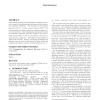508 search results - page 26 / 102 » Poly-locality in quantum computing |
FOCS
2007
IEEE
14 years 3 months ago
2007
IEEE
: We study the computational strength of quantum particles (each of finite dimensionality) arranged on a line. First, we prove that it is possible to perform universal adiabatic q...
STOC
2004
ACM
14 years 9 months ago
2004
ACM
The problem of finding a local minimum of a black-box function is central for understanding local search as well as quantum adiabatic algorithms. For functions on the Boolean hype...
ASAP
2006
IEEE
14 years 2 months ago
2006
IEEE
In the simulation of quantum circuits the matrices and vectors used to represent unitary operations and qubit states grow exponentially as the number of qubits increase. For insta...
ANSS
2005
IEEE
14 years 2 months ago
2005
IEEE
When performed on a classical computer, the simulation of quantum circuits is usually an exponential job. The methodology based on Hardware Description Languages is able to isolat...
ICALP
2005
Springer
14 years 2 months ago
2005
Springer
Abstract: The quantum adversary method is one of the most versatile lower-bound methods for quantum algorithms. We show that all known variants of this method are equivalent: spect...

